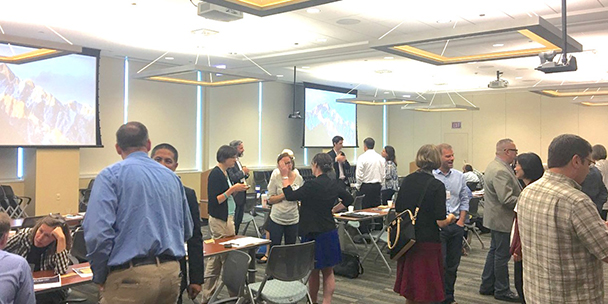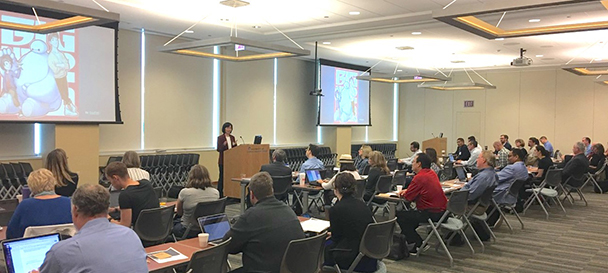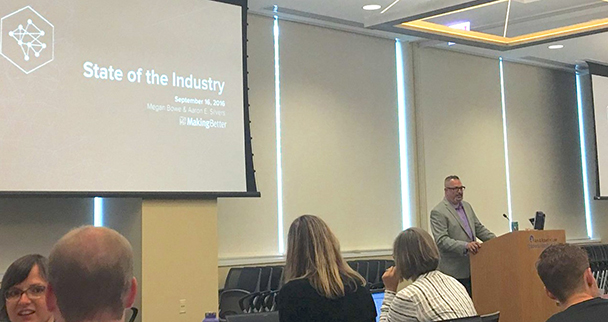The half-day, medical education-related xAPI Camp hosted by Lurie Children’s Hospital in the bustling heart of downtown Chicago on September 16, 2016, was the fifth camp this year. xAPI is rapidly gaining worldwide adoption, and the proof is in the growing and diverse body of working case studies you see at these events. I am amazed and surprised at the work of my fellow xAPI practitioners. We are working to curate case studies, if you want to view or share your own, at TryxAPI.com.

Figure 1: Discussion breakout at xAPI Camp Chicago on September 16, 2016
Following are very brief snapshots of the remarks and presentations made by the speakers at this event. You can find more details on some of the presenters and presentations here.
Norman Gill (eLearning manager, Lurie Children’s Hospital)
Norman Gill’s opening remarks for the camp highlighted Lurie’s commitment to new technology. He is very excited by the possibilities that xAPI offers. This was Lurie’s first conference, but the hospital is setting up another xAPI Camp for next year.
Sean Putman (VP, learning and development, Altair Engineering)
The first manual covering xAPI, Investigating Performance: Design and Outcomes with xAPI, will be available this fall. Sean Putman spoke about data types and presented some prototyping tips for those looking to use qualitative data to inform and for use in the initial design phase for digital learning. Quantitative data is where xAPI really comes into focus. What do the data mean to you? What does change mean to you? Context is king. When implemented properly, xAPI provides the observable, measurable, and actionable data we need in instruction.
Dave Bauer (director of learning technologies, MedStar Simulation Training & Education Lab)
Dave Bauer’s presentation was titled “Enhancing Code Blue Education (Performance) with xAPI.” MedStar has a proprietary LMS, and the group is responsible for providing the technology and resources. The group also provides an adaptable learning infrastructure to MedStar. Dave presented a case study about using xAPI to improve Code Blue performance with an app and a simulation. Code Blue is a time-sensitive life-saving engagement with teams. Dave presented an extremely compelling case study on the use of xAPI to baseline and improve performance in the Code Blue training. His group is planning to start correlating the Code Blue app training results with Code Blue simulation performance.
Myra Travin (educational futurist)
Myra Travin discussed using Slack’s canned reporting tools along with xAPI to test adaptive training algorithms. Myra is pushing the envelope to understand how people can learn in an ecosystem like Slack rather than by going through an intermediary (an actual teacher). These learner-controlled environments are going to be useful in the future.
Jessie Chuang (co-founder, Classroom Aid)

Figure 2: Jessie Chuang presents her Classroom Aid case study at xAPI Camp Chicago
Jessie Chuang presented a case study involving Classroom Aid—an xAPI-enabled mobile health system with context. Jessie had a vision of a personal health companion, citing Big Hero 6, and this is the vision her work is realizing. She is involved in the xAPI Chinese CoP (community of practice), and her work with Classroom Aid has created an xAPI script for mobile apps.
Jessie stressed the importance of creating profiles and recipes. Data show that mobile users will use health apps more and more in the coming years to monitor daily activities and to understand the effects on health and quality of life. Her case study showed a working “smart chair” app that monitored the activity of wheelchair users with chronic injuries and prescribed physical therapy. Using those data, her team created a recommendation engine to help keep these high-risk patients healthy. The patient is given suggestions to try; the app tracks his or her attempts and encourages the patient to stay healthy. The goal is to add more devices and wearables to increase precision.
The future for this work is machine learning in which the app and devices supporting the patient get and give smart guidance. The team also did work in food control of cancer patients for human-in-the-loop machine learning: The machines collaborate with the humans. The entire system uses xAPI and a centralized LRS to create a complete picture.
Nick Washburn (director, learning division, Riptide)
I spoke about Riptide’s ongoing work in enterprise technologies using xAPI. After a short “about Riptide” section, I briefly touched on multiple implementation diagrams to encourage interested xAPI Camp attendees to have deeper discussions during and after the camp. Then I demonstrated a case study of a medical-based HTML5 app using xAPI to capture a multi-point physical profile as an LRS record. The app has a touch-screen interface for a physical therapy professional or doctor to record full-body range of motion, vitals, a step test, posture, photographs, etc. All of the data sections are calculated and tallied individually to an overall physical condition results tab. The evaluation data and results posted to an LRS allow tracking and plotting over time of changes in patient physical condition.
Aaron Silvers (president and executive director, Data Interoperability Standards Consortium, or DISC)

Figure 3: Aaron Silvers presents a “State of the Industry” address at xAPI Camp Chicago
Event co-organizer Aaron Silvers wrapped the camp up with a summary of the state of the industry and next steps. What does someone who does xAPI do? He listed typical projects that people do when working with xAPI: data strategy, content strategy, learning architecture, systems integration, reporting and analytics, and experience design. There is a growing list of technology partners in xAPI as well as organizations building their own. Aaron presented some tips on finding technology vendors and communities of practice around training topics of interest. He spoke about areas of common interest, such as MedBiquitous in the case of medical, and about use of xAPI. He stressed the importance of allowing easy change of input credentials as one of the questions you should ask technology partners. He also outlined DISC (Data Interoperability Standards Consortium) focus areas, including services, partnerships, certifications, and stewardship. Certifications for LRSs and for xAPI practitioners are coming in 2017 and beyond. Aaron mentioned the Jisc effort in the UK, standardizing the entire higher-education platform around xAPI, as a good example of partnerships in DISC. The DISC community wants to be sure not to make painful breaking changes with xAPI, as it is being used in production in a growing number of ways. The ADL LRS conformance test suite is in alpha and should be released by the end of 2016. This is very important, as it will allow vendors to prove they are in conformance with xAPI and will ensure xAPI data interoperability.
From the editor—xAPI Camp and xAPI Central at DevLearn: Your access to the movers and shakers in xAPI
A few years ago, a passionate group of industry professionals began working on a new specification that would replace SCORM, the common standard that has applied to eLearning for decades. Over the last few years, that idea has matured into the full and active specification known as the Experience API (or xAPI for short).
More importantly, that passionate group of industry professionals driving understanding and adoption of xAPI has also grown tremendously over the years. Beginning in 2012 at mLearnCon (now FocusOn Learning Conference & Expo), The eLearning Guild has provided a space for conversations and connections among this group at its conferences, as well as a platform for the community at large to learn and understand how xAPI can enhance what is possible in learning and development.
At DevLearn Conference & Expo, this tradition continues with the pre-conference xAPI Camp experience, a must-attend event that showcases what is possible with the Experience API, designed to accelerate your work with this transformative technology. The xAPI Camp requires separate pre-registration.
During the DevLearn conference itself (November 16 – 18 in Las Vegas), several members of the foundational xAPI group will present sessions in the Data and Measurement track and the Emerging Tech track that will both help you get started with xAPI and optimize your use of this technology. In addition, this year at DevLearn we will provide a new platform for additional discussions on the Experience API: xAPI Central and the DISC Roundtable.
The sessions in the Data and Measurement and Emerging Tech tracks, the xAPI Central, and the DISC Roundtable are included in the registration for DevLearn Conference & Expo. Note that certain registration fee discounts are still available: eLearning Guild membership discounts; organizational discounts for nonprofit, government, and academic institutions; group discounts; and student discounts. See the registration information page for complete information, including the discounts that can be combined for even more substantial savings.
And there’s more that you should know about these Experience API bonuses! Keep reading!
What is xAPI Central?
xAPI Central is a dedicated space in the DevLearn Expo Hall. In this area, you will be able to connect with a host of vendors that are already using xAPI in their products. You’ll be able to see actual applications of xAPI in practice and learn from the vendors that are building them. It’s your one-stop shop to connect with and learn from those who are leading the way for organizations around the world to gain insights into learning and performance with the Experience API.
The DISC Roundtable
Many of the vendors in xAPI Central work together through the Data Interoperability Standards Consortium. DISC’s xAPI Roundtable will serve as the main hub of xAPI Central. At the DISC Roundtable, you’ll be able to learn about all of the different vendors and organizations currently supporting and leveraging xAPI. Informal discussions will be scheduled throughout expo hours where you can learn from and chat with recognized industry leaders in xAPI. The DISC Roundtable is also where you’ll be able to learn about the work being done through DISC to shape where vendors and stakeholders take xAPI in the future. It is a definitive source of credible, factual, and unbiased information addressing this growing community of vendors and organizational stakeholders that are collaborating to make sure different enterprise software, applications, and data using xAPI work together.



